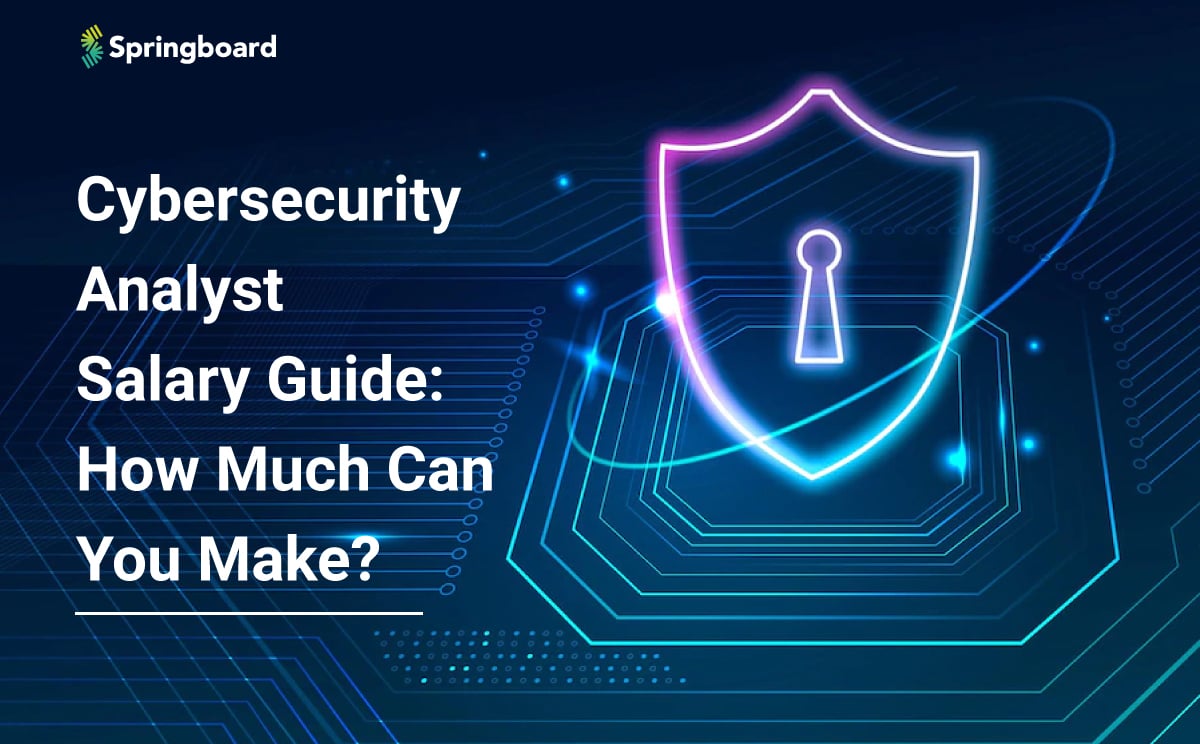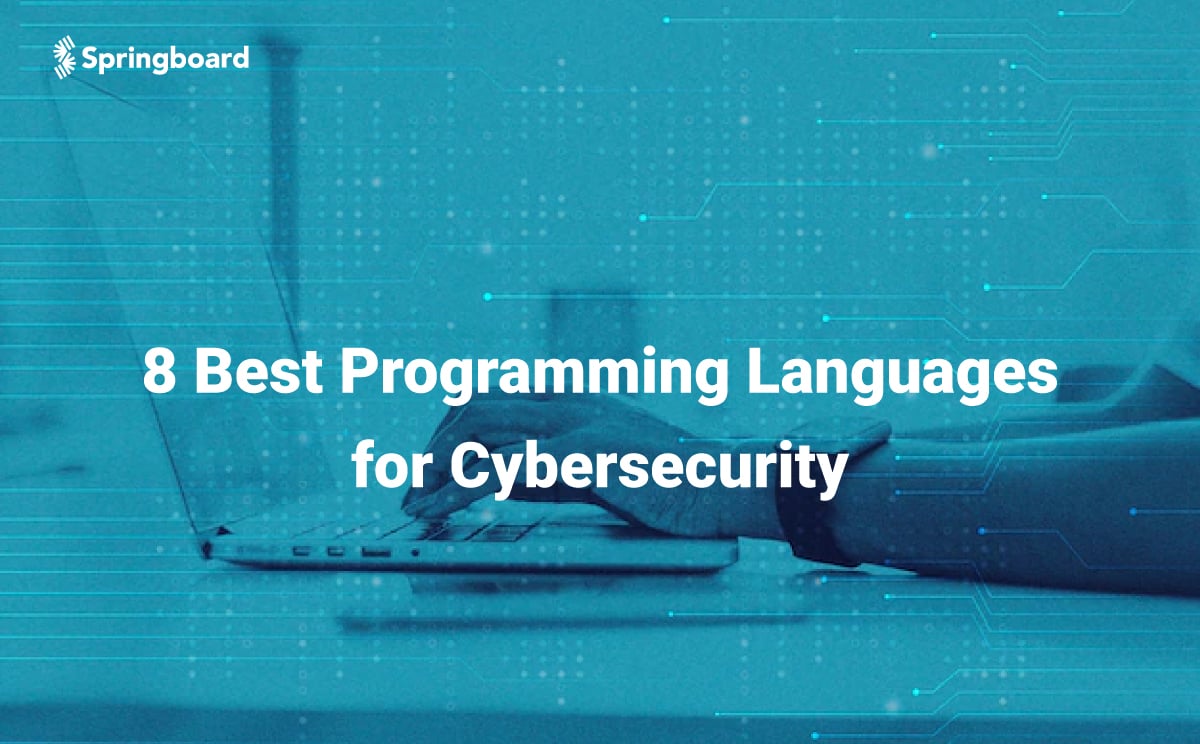Free Cybersecurity Course
Enter the cybersecurity field with our free introductory course. Learn the basics and build a strong foundation.
A career in cybersecurity offers both job stability and lucrative salaries. It’s a noble profession—you’re responsible for safeguarding sensitive data and digital assets—and because there’s such a shortage of cybersecurity professionals, it’s not unheard of for even entry-level positions to come with six-figure salaries.
One of the most efficient ways of learning cybersecurity principles and landing a cybersecurity role is with a bootcamp. Bootcamps are intensive courses that usually take place online, and promise to get you job-ready in under a year.
So if you’ve been wondering about whether a cybersecurity bootcamp is worth it, you’ve come to the right place. Read on to find out what you can learn at cybersecurity bootcamps, their pros and cons, and how to decide whether they’re the right choice for you.
Table of Contents
What Is a Cybersecurity Bootcamp?
A career in cybersecurity offers job security with a lucrative salary, plus inclusion in a noble profession that safeguards sensitive data and digital assets. The demand for cybersecurity professionals is expected to grow 32% by 2032, with a current median annual salary of $112,000. While there are many educational paths that lead to a career in cybersecurity, one of the most efficient is through a bootcamp.
A cybersecurity bootcamp is a focused, intensive learning path in which students gain a cybersecurity education over the course of a few months. The entire goal of the process is to take absolute beginners and prepare them for an entry-level cybersecurity job using real-world projects to ensure realistic hands-on training.
Unlike a conventional college degree covering a more general curriculum, bootcamps focus on just a singular field, cybersecurity skills. Bootcamps usually train students in security fundamentals such as threat intelligence, basic security measures, application security testing, and network security. Additionally, bootcamps offer career coaches and services to students, and some have flexible learning options, like online and in-person sessions.
Cybersecurity Bootcamps: Pros and Cons
Cybersecurity bootcamp programs are a great option for those looking to quickly gain technical skills in this field. However, they aren’t necessarily for everyone. Here are a few things you need to take into account about the advantages and disadvantages of enrolling in a cybersecurity bootcamp.
Pros
This is what makes a cybersecurity bootcamp so appealing:
- Beginner-Friendly Approach: Cybersecurity bootcamps are usually geared towards beginner students. That means that there are very few prerequisites for anyone looking to enroll in such a course. A foundational knowledge of computers and the Internet is often enough. There are, of course, more advanced cybersecurity bootcamps out there. But if you sign up for one that’s meant for beginners in the field, you’ll be able to get by even if you don’t have pre-existing technical skills.
- Streamlined Learning Path: If you complete conventional college programs in areas like computer science or IT with the goal of making a career in cybersecurity, then you will have to work through various unrelated classes. A cybersecurity bootcamp, on the other hand, focuses exclusively on skills that are relevant to the cybersecurity industry. As a result, you can become a job-ready candidate a lot quicker and without having to work through classes in other disciplines.
- Up-to-Date With Industry Standards: Cybersecurity bootcamps update their curricula more regularly than colleges do. It also helps that bootcamps hire experienced instructors who have worked or are currently working in the industry. These are things that you usually don’t get in a college education.
- Mentorship and Career Coaching: A bootcamp education is often supplemented with various career services. Students at many bootcamps get access to a mentor or student advisor who works with them on a one-on-one basis to understand their career goals and provide job-search strategies. This ensures that you don’t just pick up technical skills but also understand what it takes to land a job in the cybersecurity industry.
- Job Guarantees: Any cybersecurity bootcamps offer their students a guaranteed job, meaning that if you don’t land a job within a certain amount of time after graduation, then you’ll receive a tuition refund.
Vladimir Terekhov
In my experience, completing a tech bootcamp is highly valuable for job candidates. It demonstrates a commitment to learning and a practical, hands-on approach to acquiring new skills that are often immediately applicable to real-world projects. Bootcamp graduates bring fresh perspectives and a can-do attitude that is essential in the fast-paced tech industry.
Tech bootcamps are intensive and focused, which helps candidates develop a strong foundation in their chosen field quickly. Candidates from bootcamps often have the latest industry knowledge and are eager to apply it, making them great assets to teams that need to stay ahead of the curve.
Cons
Here are some of the downsides of a cybersecurity bootcamp:
- Intensive Process: Cybersecurity bootcamps are no walk in the park. They often require students to be able to commit to multiple hours of study, several per week. To add to that, you’ll also have to complete projects and assignments. All of that can be a big ask, especially if you’re also juggling a full-time job.
- Narrow Focus: Some see the advantage when cybersecurity bootcamps focus only on topics pertaining to the field. But that also means you have to be absolutely sure you want to work in cybersecurity. If that’s not the case, it may be more beneficial for you to choose a more general learning path, like software development.
- Missing Out on a Conventional Degree: College degrees are time-intensive and cost-intensive, but they have their pros, too. A college degree will give you a broader education than bootcamp, and many consider college to be something of a rite of passage.
Understanding Cybersecurity Bootcamps: Things To Know
Not every cybersecurity bootcamp is built the same. Let’s take a look at what you can expect to achieve and experience in your time at a bootcamp.
How Do Cybersecurity Bootcamps Work?
Most cybersecurity bootcamps aimed at beginners have pretty relaxed admission requirements. That means prospective students can apply to these programs regardless of educational background and current level of technical knowledge. If you are accepted, you will have a few payment options, usually between upfront payment, month-to-month payment, and a deferred tuition plan.
The mode of delivery varies between different bootcamps. The majority of bootcamps are online-only with synchronous live classes. That means you will have to log in to classes at a specific time and take part in class discussions. Some students opt for in-person classes.
The amount of time you will have to commit on a weekly basis varies from bootcamp to bootcamp. There are usually both part-time and full-time options. Full-time students usually have to be able to do multiple hours of coursework every day. Part-time students, on the other hand, will be required to do a few hours each week.
A large portion of your bootcamp will be focused on hands-on projects, which are designed to help you apply the new cybersecurity concepts you’ve learned. The hands-on experience that you gain will help you understand how cybersecurity specialists do their work in the real world. You can also add your hands-on projects to your cybersecurity portfolio.
Finally, you will be required to submit a capstone project in order to complete the bootcamp. Students usually get the help of a mentor to come up with a theme for their project. Many bootcamps include a presentation day so that students pick up some of the soft skills required to communicate their cybersecurity work to an audience.
What Can You Expect To Learn During a Cybersecurity Bootcamp?
- Skills: A beginner cybersecurity bootcamp will take you through all of the basic skills in the field. That includes basic security concepts like risk management, cryptography, network security, and threat detection.
- Tools: There are various cybersecurity tools that are used in the field to assist with streamlining workflows. Depending on the bootcamp that you attend, you may be taught how to use tools like Splunk, Hashcat, Kali, and OpenSSL.
- Systems: Working with different operating systems is a big part of the work of a cybersecurity engineer. There’s a good chance that beginner courses in cybersecurity cover Windows Server and Linux. You will learn how to maintain these operating systems and set up security measures.
- Programming: You may also learn how to use programming to carry out certain tasks. Programming languages are often used to automate things like threat detection. Python, Javascript, and Java are the languages most commonly used in the field.
Are There Prerequisites for a Cybersecurity Bootcamp?
Cyber security bootcamps aimed at beginners have very few prerequisites. In most cases, you will just need to be computer literate and know how to use the Internet. More advanced bootcamps will have stricter prerequisites that depend on the specific area of cybersecurity that they focus on.
Is a Cybersecurity Bootcamp Worth It for Me?
Here are some of the ways that you can figure out whether a cybersecurity bootcamp is the right choice for you.
A Cybersecurity Bootcamp Is Worth It for You if…
- You’re Certain About Cybersecurity: If you’re absolutely certain about a career in cybersecurity, then a cybersecurity bootcamp makes a lot of sense. It’s an educational modality that’s quite affordable and almost ensures that you’re ready for the professional world. But if you have any doubts about whether cybersecurity is for you, then you should avoid a bootcamp.
- You Have the Time for It: There is a significant time commitment that comes with enrolling in a cybersecurity bootcamp. You should always make sure to check exactly how much time you’re required to spend in classes and mentorship sessions before signing up. You’ll then want to add a few hours to that each week for independent study. Enroll in the bootcamp only if you’re able to commit that amount of time every week over a few months.
- You Have the Funds: Cybersecurity bootcamps are significantly cheaper than a college degree. However, they may still be a pricey affair for some. Signing up for a bootcamp is worth it only if it is within your means and you have money saved up to tide you through the time that you spend in the program.
A Cybersecurity Bootcamp Is Not Worth It for You if…
- You’re Still Exploring the Tech Field: You have many different options when it comes to a career in technology. Despite the high demand for cybersecurity professionals at the moment, that doesn’t necessarily mean it’s the right niche for you. If you’re unsure about which tech discipline you want to work in, then it makes more sense to consider a coding or software engineering bootcamp, because those skills transfer to other fields easily.
- You Don’t Do Well With Online Learning: Most cybersecurity bootcamps are online. Even those conducted offline may have some online components. If you prefer in-person classes, then a cybersecurity bootcamp might not be for you. You can, however, research offline bootcamps in your area and visit the facility to get more details.
- You Aren’t Ready To Work in Cybersecurity: The investment of time and money that you will make in a cybersecurity bootcamp makes sense only if you’re resolved to work in cybersecurity. Those who are still at a stage ofexploring different career options shouldn’t sign up for a bootcamp. This is especially true because most bootcamps dedicate a lot of time to providing job-specific support, and that becomes irrelevant if you aren’t sure you want to work in the industry.
Get To Know Other Cybersecurity Students
Karen Peterson
Compliance Advisory Associate at Coalfire
Gabrielle Oler
Systems Administrator at Coherent Technical Services
Ed Burke
Cyber Security Career Track Student at Springboard
Cybersecurity Bootcamps vs. Other Learning Methods
A bootcamp is just one of the options you have at your disposal when it comes to picking up cybersecurity skills. Let’s take a look at how it stacks up against other modes of learning.
Cybersecurity Bootcamp vs. University Degree
- University degrees are still a viable option when it comes to learning cybersecurity. At the undergraduate level, a degree in computer science or IT will provide you with a strong foundation to go on to study cybersecurity. You can also consider a master’s degree specializing in cybersecurity if you want to qualify for some of the more advanced roles in the industry right out of college.
- The advantage of a university degree is that it gives you a well-rounded perspective of different programming languages, concepts, and tools. You get to work with different professors over several years, and that often means a quite rich and engaging learning process.
- However, those things also come at a cost. A university education is costly, and it can take several years to pay off student loans. Bootcamps, on the other hand, are a lot more affordable, and a lot of them come with a job guarantee, which universities don’t offer.
Cybersecurity Bootcamp vs. Self-Taught Route
- Learning cybersecurity on your own is possible thanks to all of the various free and paid resources that are available online. You can start with just YouTube videos and work your way up to more advanced courses as you become more skilled.
- The self-taught route is the one that offers the most independence and flexibility. It’s also the cheapest option. That said, not everyone can teach themselves something as technically challenging as cybersecurity. Bootcamps offer a mix of expert instruction and accountability that’s lacking in the self-taught mode.
Landing a Job After a Cybersecurity Bootcamp
Here are a few things that you need to know about landing a job after completing a cybersecurity bootcamp.
Susan Bortone
I work with multiple HR and hiring managers as well as job seekers and often encourage taking classes and Bootcamps – in the tech space as things change so quickly it is ideal to those who are looking to shift careers, or grow in their current careers through enhanced knowledge or skills. Additionally, especially for anyone who has been laid off or is out of work and worried about filling a gap on a resume, classes are a great way to do this. It shows initiative and personal growth on your resume and gives you talking points around recent focuses in your career.
Making a Career in Cybersecurity Through a Bootcamp: Real-Life Examples To Inspire You
Here’s a look at a couple of people who successfully went on to careers in cybersecurity after completing a bootcamp.
Anne Leslie
Anne Leslie had a degree in business and several years of experience in banking before she decided she needed to change something up. So she became part of an initiative that concerns itself with diversity in the cybersecurity industry and completed a cybersecurity bootcamp. In the linked post, she chronicles her unconventional journey, and how she eventually landed a cybersecurity role at the tech giant IBM.

TJ Livermore
TJ Livermore was an HVAC technician before he signed up for a cybersecurity bootcamp. After completing the bootcamp, he managed to land a job in security at the Canadian Imperial Bank of Commerce (CIBC). TJ’s story is evidence of how a cybersecurity bootcamp can help you break into the tech industry without any prior experience, even if you’re juggling another job at the same time.

FAQs
We’ve got the answers to your most frequently asked questions.
Is a Cybersecurity Bootcamp Hard?
Cybersecurity bootcamps are not particularly hard if you’re interested in the field. Most bootcamps are beginner-friendly, and instructors are helpful with any doubts that students may have.
Is a Cybersecurity Bootcamp Good for Beginners?
Yes, cybersecurity bootcamps are good for beginners. There are countless examples of people who have broken into the tech industry without any prior experience after completing a cybersecurity bootcamp.
What Are Some Good Cybersecurity Bootcamps?
Springboard’s Cybersecurity Bootcamp is highly regarded within the industry, and to further assist those seeking top-quality education in this field, and here we’ve compiled a comprehensive list of the best cybersecurity bootcamps.
Since you’re here…
Breaking into cybersecurity doesn’t take a Trojan Horse. Our Cybersecurity Bootcamp lasts just six months, and we’re ready to help you land a job after graduation or your money back. There’s urgent need in this field, so we’re beaming out tons of freebies to entice you, like this email course on certifications and our guide to becoming a software security analyst. Join in—there are plenty of jobs to go around!






